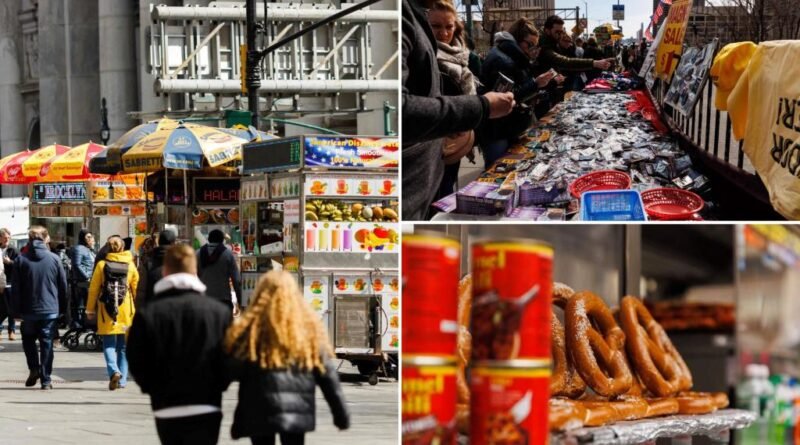We’re fighting illegal street vending to keep NYC clean and safe for all
New Yorkers love our street vendors.
We adore our hot-dog carts when we need a quick lunch, the umbrella stands that appear like magic in a sudden downpour and the arepas, momos and birria that reflect our city’s diversity.
The smallest small businesses provide opportunities for people chasing the American dream, and most of the time, they make our neighborhoods more vibrant.
But if we’re not careful, unregulated street vending can make our sidewalks unsafe, impassable and filthy — just ask the New Yorkers who call 311 to report vending issues, an average of about 1,000 times per month.
As the sanitation commissioner and the chair of the City Council Committee on Consumer and Worker Protection, we approach this issue from different perspectives, but we’ve reached the same conclusion: The rules around street vending exist for a reason, and we can’t be afraid to enforce those rules with a focus on cleanliness and accessibility.
Items cannot be left out overnight, chained to light poles and street signs.

Rules around trash removal and grease disposal must be followed if we want to keep up with the war on rats.
“No vending” zones must be observed, and vendors must abide by distance rules from curbs, subway stations and store entrances so that pedestrians, strollers, wheelchairs and deliveries are not obstructed.
For years, New York City has not had an appropriate staffing model for meaningful street-level enforcement around these very basic rules for street vendors.
That will change April 1 when dozens of new sanitation police officers begin to hit the streets focused on illegal street vending — among the most visible challenges to cleanliness across the city.
Whether it’s piles of discarded packaging in Flushing or unlicensed food sales in Times Square, New Yorkers want to see the streets clean — and the vendors who follow the rules need to be protected from unfair competition, too.

As with all sanitation enforcement, the focus here will be on compliance and cleanliness.
We never have and never will write summonses frivolously and will make use of written warnings for first offenses whenever possible before writing a summons or confiscating property.
As far as we can remember, sanitation police have never arrested anyone.

They do what needs to be done for people to comply — to get the streets clean and to keep them that way.
Enforcement of the rules around what is ultimately a quality-of-life issue should be handled by people with specific experience at the intersection of cleanliness, safety, businesses and communities.
That means sanitation police officers who train for this kind of work.
They specialize in keeping sidewalks open, streets clean and our neighborhoods healthy.
And they won’t be doing it alone.
They’ll be working with food inspectors from the Department of Health and Mental Hygiene, with culturally appropriate outreach staff (including multilingual outreach) from the Department of Small Business Services, with Department of Transportation plaza and public-space teams and with the vendor-licensing teams at the Department of Consumer and Worker Protection — all to make sure New York City finally has a smart and effective interagency plan in place that protects our street vendors and balances our communities’ needs.
That’s what we need if we want tourists to feel safe, if we want vendors to feel safe and if we want our neighbors to feel safe.
The two of us have walked the streets in The Bronx together many times.
We’ve cleaned up litter together.
We’ve fought illegal dumping together.
And we’ve talked about how to make sure our neighborhoods are as clean as possible, together.
This new enforcement strategy is the right move for our streets and for the people who walk on them — and that’s not just something we’re selling.
Jessica Tisch is commissioner of the New York City Department of Sanitation, which takes over enforcement of rules around illegal street vending April 1. Marjorie Velazquez represents parts of The Bronx in City Council and serves as chair of the Committee on Consumer and Worker Protection, which has oversight of vending-related rules.




